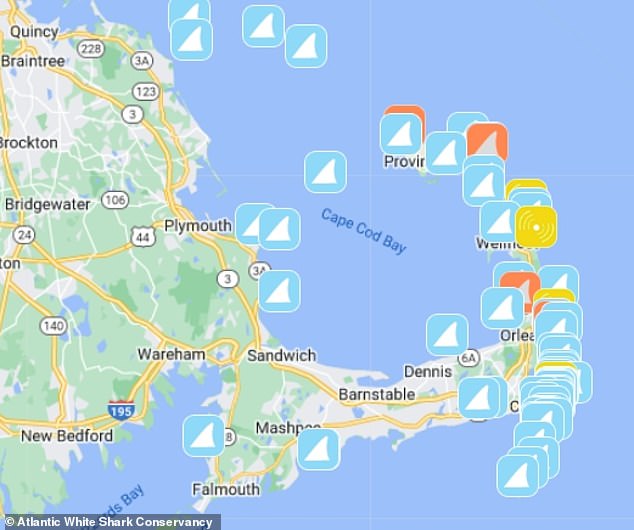Cape Cod swimmers reveal fatalistic reasons why they're not scared to swim in great white shark infested waters - and one man's strange 'trick' to stay safe
- READ MORE: America's most dangerous beaches revealed
- READ MORE: R.I.P. tide: Florida has 7 out of 10 of 'America's deadliest beaches'
Cape Cod swimmers have revealed they are not scared of paddling off the coast - despite the water being infested with great white sharks.
Beachgoers in the luxury Massachusetts enclave were nonplussed when asked if they'd take a dip in the ocean among the vicious apex predators.
They revealed morbid tricks on how they believe they can stay safe - even as officials warn of dozens of sightings over the summer months.
Shark season kicked off in May with two sightings, before dozens were seen over the past few months.
In the last month there have been nearly 50 confirmed sharks seen along the coast of Cape Cod, as well as several other reporter sightings.

Shark season kicked off on the Cape in May with two sightings that has since evolved into dozens since, but residents and tourists alike don't plan on letting that bother them

In the last 30 days, nearly 50 confirmed sharks have been spotted along the coast of Cape Cod
'Until we see someone get hurt by a shark, we probably won't change our habits,' Charles Washburn, who regularly swims in the ocean, told the Boston Globe.
'If it's my time, it's my time,' Sophie Walker, of Brewster, told the outlet.
In the last 48 hours, no sharks have been spotted in the area, but several sharks' acoustic tags have been detected, according to the map.
Luke Mongillo, 17, of Cheshire, Connecticut, shared his best tip to stay safe in shark-infested waters - and it comes with sacrificing others.
'I have this rule where I don't go out further than the furthest person. So if anything happens, then they'll be first,' he told The Globe.
Despite many people beachgoers being wary of the chance shark encounters, most aren't allowing it to dictate their experience on the sandy oasis.
'Realistically, I know you're more likely to die in a car crash,' Samantha Young, of Massachusetts, said. 'I always get anxious about sharks but never stay out of the water.'

Luke Mongillo, 17, shared his best tip to stay safe in shark-infested waters - and it comes with sacrificing others. 'I have this rule where I don't go out further than the furthest person. So if anything happens, then they'll be first,' he said

There are many ways to help avoid getting attacked by a shark, which includes avoiding murky waters, following flag warnings, avoiding seals and school or fish, among others
Beach towns along both coasts of the US have enhanced their shark spotting capability by employing drones and planes, having lifeguards keep an eye out, and using colored flags to warn swimmers.
The National Seashore has prohibited swimming up to 33 times in recent summers due to sharks getting a little too close for comfort, according to The Globe.
However, the last time the Cape has seen a fatal attack was in 2018, when a 26-year-old was killed at Newcomb Beach.

Cape Cod became a shark hotspot in the last 15 years due to warming waters and a rise in the seal population , with peak activity hitting around August and early Fall (pictured: screenshot of movie Jaws)
There are many ways to help avoid getting attacked by a shark, according to the National Parks Service, which includes avoiding murky waters, following flag warnings, avoiding seals and school or fish, and never entering the water alone, among others.
'We have to change our behavior in the presence of sharks, since they're not going to change their behavior for us,' Deputy Superintendent of the Cape Cod National Seashore, Leslie Reynolds, told The Globe.
Cape Cod became a shark hotspot in the last 15 years due to warming waters and a rise in the seal population, with peak activity hitting around August and early Fall.
A landmark study - published in the Marine Ecology Progress Series journal - monitored the coastline from 2015 to 2018, found around 800 individual great white sharks in the area and would grow year-over-year, Conservancy scientists, including Winton, found at the time.
'It blows a lot of people's minds that there are sharks on the coastline,' Conservancy scientist, Megan Winton, told the outlet. 'Most people don't think of New England as a wild place.'
Only one beach - Head of Meadow Beach in Truro - had to be shut down this year due to a shark spotting.






































































































































































































































































































































































